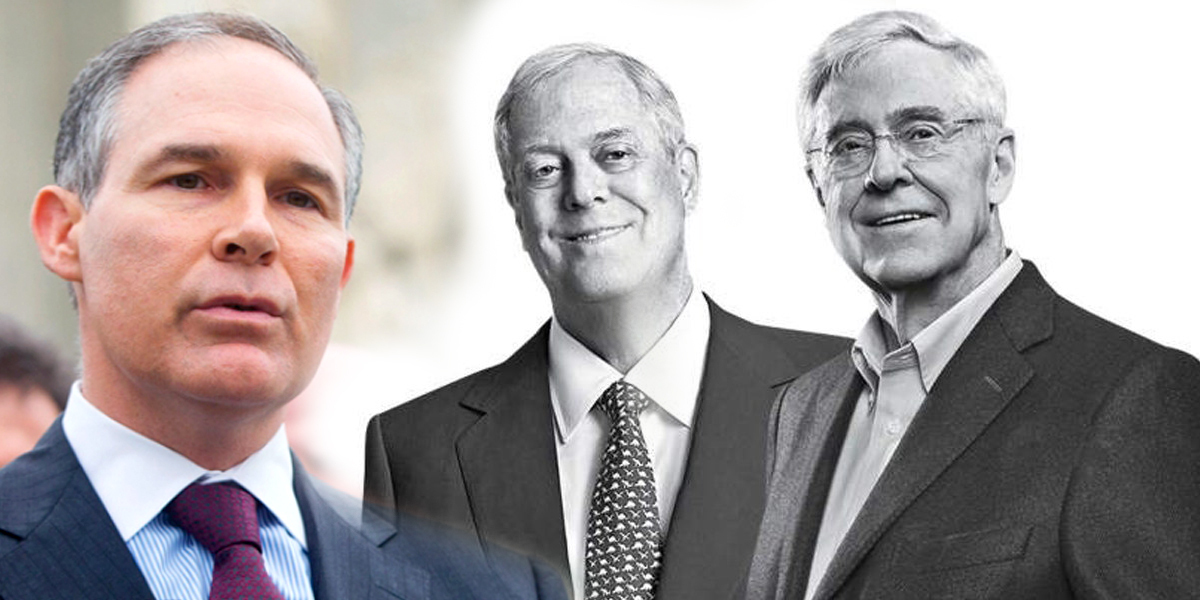

By Elliott Negin
The two dozen nonprofit groups and Senate committee members defending Scott Pruitt, President Donald Trump’s nominee for the U.S. Environmental Protection Agency (EPA) administrator, have at least two things in common.
Like Pruitt, they’re climate science deniers. And, like Pruitt, most of them are funded by Charles and David Koch, the billionaire brothers who own the coal, oil and gas conglomerate Koch Industries.
That funding helps explain why they all consistently misrepresent the scientific consensus on climate change. After all, money buys influence and since 1997, Koch foundations have paid a network of think tanks and advocacy groups more than $88 million to spread climate science disinformation—more than twice what Exxon, the second-biggest denier-network funder, has spent. Likewise, Koch Industries has contributed $38.5 million to federal candidates over the last 25 years and spent another $117 million since 1998 on lobbying.
America Has a Koch Problem https://t.co/ochBtJRg5V #kochbrothers @foe_us @SierraClub @greenpeaceusa @350 @billmckibben @ClimateReality
— EcoWatch (@EcoWatch) January 25, 2017
The Kochs didn’t endorse Trump for president, but there’s no doubt they would consider a guy like Pruitt heading the EPA a dream come true. When David Koch ran for vice president on the Libertarian Party ticket back in 1980, his party platform called for abolishing the EPA (and a number of other federal agencies, along with Medicare, Medicaid and Social Security). Although Pruitt won’t be able to go that far, his six-year track record as Oklahoma’s attorney general suggests he will do what he can—with the help of Koch-funded members of Congress and the rest of the Trump Administration—to defund the agency and undermine its authority.
Koch Denial Network is Alive and Well
In advance of Pruitt’s nomination hearing before the Senate Environment and Public Works Committee on Jan. 18, a coalition of 23 nonprofit groups sent a letter to the entire Senate urging his confirmation. “Attorney General Pruitt has consistently fought for Oklahoma families and communities,” the letter states “and has been a stalwart defender against federal intrusion into state and individual rights.”
In fact, Pruitt has consistently fought for the corporate polluters that have financed his political campaigns, dismantling his office’s Environmental Protection Unit, halting efforts to reduce poultry manure in Oklahoma waterways, opposing a wind energy transmission line and suing the EPA 14 times to block stronger air, water and climate safeguards that would better protect Oklahoma families and communities.
But I digress. Let’s follow the money.
The groups that signed the letter endorsing Pruitt include such high-profile, climate-science-denier organizations as the American Energy Alliance (AEA), whose president, Thomas Pyle, is a former Koch Industries lobbyist; the Competitive Enterprise Institute (CEI), whose top climate disinformer, Myron Ebell, oversaw the Trump EPA transition team; and Heritage Action, the political arm of the Heritage Foundation. Heritage economist David Kreutzer, who maintains there is no justification for Obama Administration climate policies, also served on the EPA transition team.
https://twitter.com/foe_us/status/825003943767977989 have done great damage…” Democratic committee members, conversely, pressed Pruitt on his financial ties to fossil fuel interests, his efforts to weaken environmental safeguards and his scientifically indefensible claim that the role human activity plays in causing climate change is “subject to continuing debate.”
Why were Republican EPW Committee members so hospitable to Pruitt?
Like Pruitt, most of them are on the Koch gravy train and their campaign coffers are flush with fossil fuel industry cash. Nine of the 11 Republicans on the committee together received $368,000 in campaign contributions from Koch Industries over the last five years. Even more telling, the company was among the top 10 donors for seven of those nine beneficiaries and the top donor for two—Jim Inhofe of Oklahoma and Jeff Sessions of Alabama, who is in line to become the Trump administration’s attorney general.
In addition to the Koch funding, the Republican committee members received more than $1.5 million since 2011 from a veritable Who’s Who of energy companies, including coal giants Alpha Natural Resources, Arch Coal, Murray Energy and Peabody Energy; oil and gas titans BP, Chevron, Devon Energy, Exxon, Marathon Oil and Valero Energy; and electric utilities American Electric Power, NextEra Energy and Southern Company. Pruitt, meanwhile, received $62,500 since 2010 from Koch Industries and eight other companies listed above, including Devon Energy, Exxon and Valero Energy.
By contrast, none of the 10 Democrats on the committee received Koch money, let alone any coal or oil and gas industry support. The only energy-related businesses that contributed to their campaigns in the last five years were three diversified electric utilities that are heavily invested in nuclear power: Dominion Resources, Entergy and Exelon.
Drain the Swamp?
Donald Trump campaigned as a populist who promised to stand up to Washington lobbyists and “drain the swamp.” The back story on Scott Pruitt—and the vast sums spent by the Kochs and other fossil fuel interests to promote their agenda—tell a very different story.
Still, one may fairly question what any of this actually proves. Does money really dictate the positions that a nonprofit think tank or U.S. senator takes, be it on climate change or any other policy issue?
As it turns out, none other than David Koch addressed this very question in an interview with Brian Doherty, author of the 2007 book, Radicals for Capitalism: The Freewheeling History of the Modern American Libertarian Movement. Koch was talking specifically about funding think tanks and advocacy groups, but what he said could easily be applied to elected officials as well.
“If we’re going to give a lot of money, we’ll make darn sure they spend it in a way that goes along with our interest,” Koch told Doherty. “And if they make a wrong turn and start doing things we don’t agree with, we withdraw funding. We do exert that kind of control.”
I rest my case.
Elliott Negin is a senior writer at the Union of Concerned Scientists.

 233k
233k  41k
41k  Subscribe
Subscribe 